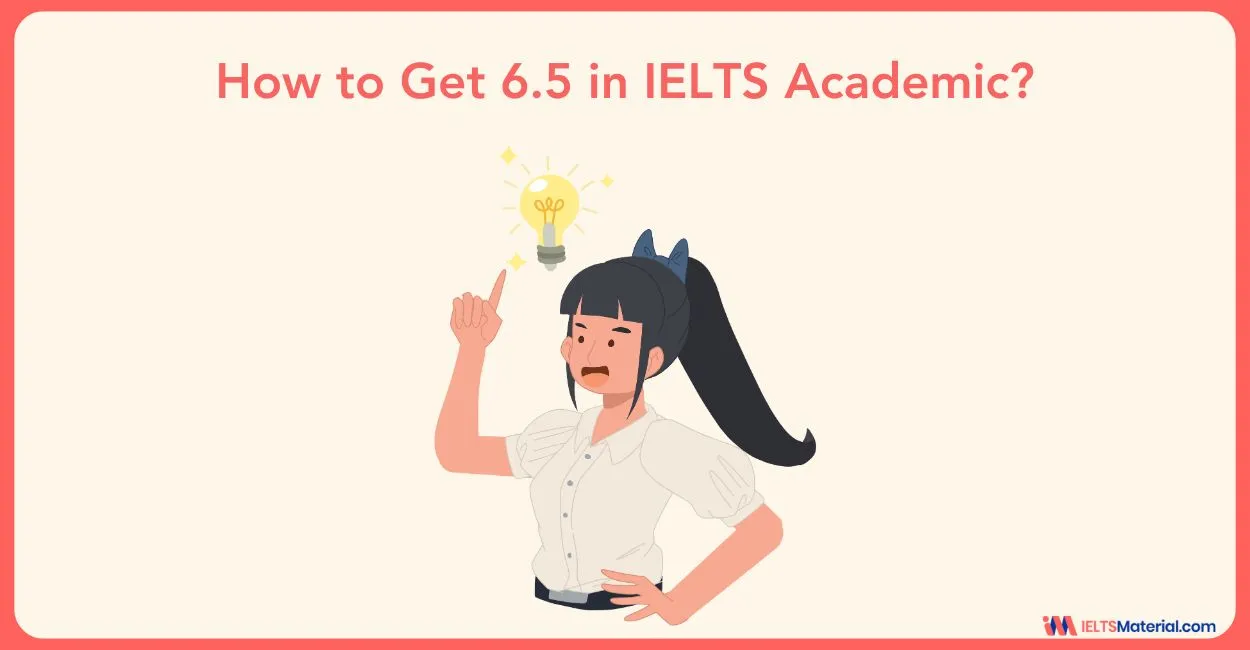How to Get 6.5 in IELTS Academic?
2 min read
Updated On
-
Copy link
Need guidance on how to get 6.5 in IELTS Academic? Learn exactly what it takes with practical tips, prep hacks, and scoring insights to help you reach your goal faster!
Table of Contents

Limited-Time Offer : Access a FREE 10-Day IELTS Study Plan!
IELTS is a general requirement for university admissions in many places, if you are not a native English speaker. Most universities worldwide require an IELTS band score 6, with 6.5 being the most common requirement.
An overall score of 6 or 6.5 shows that the individual can cope in a classroom situation even though they might commit some mistakes. There are certain universities which provide three month courses for students who need that extra help, before the course begins. So, let us look at how to get 6.5 in IELTS Academic.
Quick Tips on How to Get 6.5 in IELTS Academic
Your overall IELTS score is calculated as an average of the four module scores. So, check out what is means to get an overall 6.5 in IELTS exam.
IELTS Listening Band 6.5
- For IELTS Listening, 26 out of 40 answers must be correct.
- Spell answers correctly.
- Check on the number of words to answer the question.
Are you having difficulty improving your IELTS band score?
IELTS Reading Band 6.5 (Academic Module)
- For IELTS Reading, 27 out of 40 answers must be correct.
- Make sure you have written the spelling of the answers correctly.
- Not write more than the maximum number of words for each question.
IELTS Writing Band 6.5 (Academic Module)
- In IELTS Writing, you have to answer both questions.
- Show good organizing skills (e.g. paragraphs, linking words).
- Try using high- level vocabulary only if confident.
- Provide an overview with supporting details in IELTS Writing Task 1.
- Indicate a position and provide supporting arguments in IELTS Writing Task 2.
- Make yourself understood (even if grammatical mistakes are made)
IELTS Speaking Band 6.5
- In IELTS Speaking, you have answer some introductory questions for IELTS Speaking Part 1, an IELTS cue card topic for the next part and some more IELTS Speaking Part 3 questions.
- Use a range of linking words to connect ideas.
- Show good ability to paraphrase.
- Use both simple and complex structures.
- Speak with generally good pronunciation.
Self Study Activities
Apart from all these IELTS exam preparation tips, use the language more often. Expose yourself to more English, be it in the form of news, radio, chat shows, movies, books, etc.
Do not stop practicing!
At a point, you might feel that you know much about the IELTS exam and that you are confident enough to attempt it and stop practicing. This is a very common mistake students commit. Practice is the only way to improve your proficiency and, therefore, make sure you practice each module.
Also check:
Explore IELTS related articles

Start Preparing for IELTS: Get Your 10-Day Study Plan Today!
Recent Articles

Nehasri Ravishenbagam

Nehasri Ravishenbagam

Haniya Yashfeen





Post your Comments